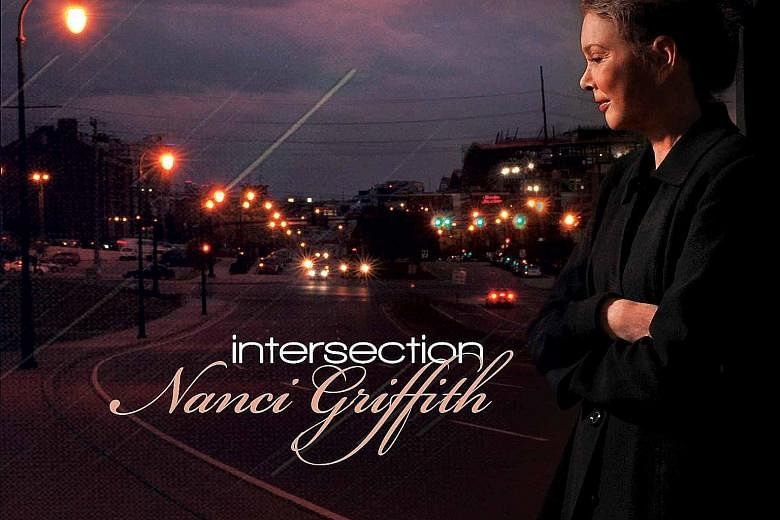NASHVILLE • Nanci Griffith, a Grammy-winning singer and songwriter who kept one foot in folk and the other in country and was blessed with a soaring voice equally at home in both genres, died last Friday. She was 68.
Her death was announced by her management company, Gold Mountain Entertainment. It did not state where she died or give a cause of death, saying only: "It was Nanci's wish that no further formal statement or press release happen for a week following her passing."
While Griffith often wrote political and confessional material, her best-loved songs were closely observed tales of small-town life, sometimes with painful details in the lyrics, but typically sung with a deceptive prettiness.
Her song Love At The Five And Dime, for example, tracks a couple's romance from its teenage origins. It was a country hit in 1986 - not for Griffith, but for Kathy Mattea. Similarly, Griffith was the first person in 1987 to record From A Distance, but the song was later a smash hit for Bette Midler (1990).
Griffith sometimes affected a folkie casualness towards mainstream success. She told Rolling Stone in 1993 she did not mind that Mattea had the hit version of Love At The Five And Dime. "It feels great that Kathy has to sing that for the rest of her life and I don't," she said.
Nanci Caroline Griffith was born on July 6, 1953, in Seguin, Texas, to Marlin Griffith, a book publisher and singer in barbershop quartets, and Ruelen Strawser, a real estate agent and amateur actress.
"I come from a basically really dysfunctional family," she told Texas Monthly in 1999. "I had very, very irresponsible parents."
When she was a child, her family moved to Austin. Her parents divorced in 1960. By the time she was 12, she was writing songs and playing in Austin clubs.
As a teenager, she saw a performance by melancholy Texas troubadour Townes Van Zandt. She identified with his song Tecumseh Valley, about a doomed woman named Caroline, and it became a staple of her songbook.
She told The New York Times in 1988: "When I was young, I listened to Odetta records for hours and hours. Then when I started high school, Loretta Lynn came along. Before that, country music hadn't had a guitar-playing woman who wrote her own songs."
After attending the University of Texas, Griffith worked as a kindergarten teacher while she pursued music. She won a songwriting award at the Kerrville Folk Festival in Texas and released her first album, There's A Light Beyond These Woods, in 1978.
It was the first of four folk albums she would make for tiny labels in an eight-year span. In 1985, she moved to Nashville, where she received a major-label contract.
Writing in The New York Times in 1987, Stephen Holden hailed her signing with MCA Nashville, calling her "among the most gifted writers to carry forward a Southern country variant of the confessional singer-songwriter mode that dominated Los Angeles rock in the early and mid-1970s".
She assembled a band, The Blue Moon Orchestra and beefed up her songs with country-pop muscle, a blend she called "folkabilly".
Her record label, however, was befuddled by her. She told Rolling Stone in 1993 that "the radio person at MCA Nashville told me that I would never be on radio because my voice hurt people's ears".
Her breakthrough came when she shifted labels, to Elektra, and returned to her folk roots. Her 1993 album, Other Voices, Other Rooms, named after Truman Capote's debut novel, comprised 17 versions of songs by her folk forebears.
It won the 1994 Grammy Award for best contemporary folk album and was certified gold for sales of more than 500,000 copies.
She followed it up in 1998 with the album Other Voices, Too (A Trip Back To Bountiful), accompanied by a book, Nanci Griffith's Other Voices: A Personal History Of Folk Music.
In 2008, the Americana Music Association gave her a Lifetime American Trailblazer Award. In 2012, the year she released her 18th and final studio album, Intersection, she said: "I am putting to music and words things that have angered me and hurt me. All of a sudden, they were there and ready to come out."
Griffith was married to Texas singer-songwriter Eric Taylor from 1976 to 1982. Complete information on survivors was not immediately available.
NYTIMES

